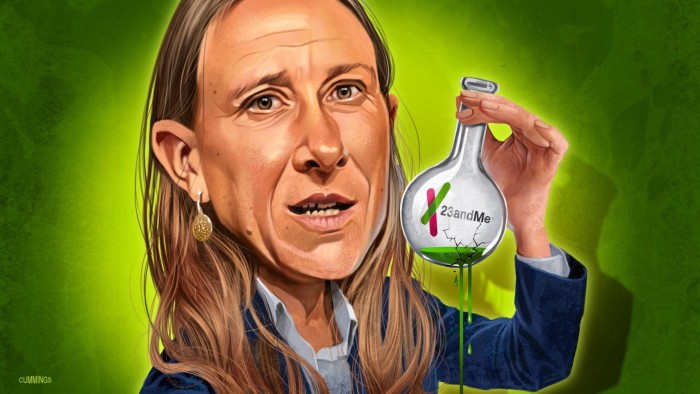Unlock the Editor’s Digest for free
Roula Khalaf, Editor of the FT, selects her favourite stories in this weekly newsletter.
In 2008, Anne Wojcicki used the combined efforts of charm and Silicon Valley connections to orchestrate a series of celebrity-studded “spit parties” publicising her new DNA-testing start-up 23andMe. From New York Fashion Week to Davos, public figures such as Ivanka Trump and Chevy Chase dutifully filled 23andMe’s test tubes with their saliva.
Wojcicki’s relentless optimism and charisma were credited with helping the company wave aside both customer privacy fears and regulatory scrutiny. In the nearly two decades since she co-founded 23andMe, some 15mn people have splashed out on the company’s $99 genetic-testing kit.
Many now appear to regret that decision. This week the company’s website crashed as customers rushed to delete their genetic data following its decision to file for bankruptcy.
The share price has fallen more than 99 per cent since 23andMe went public in 2021 and it is locked in investor disputes. Customer demand has dried up and there are concerns over who owns its trove of genetic data. Yet Wojcicki, who stepped down as chief executive on Sunday, remains resolute that she can buy the company back and lead it to success once more.
Former employees say Wojcicki’s confidence is shaped by Silicon Valley’s unwavering faith in scientific innovation. Born in Palo Alto in 1973, she spent much of her childhood roaming the campus of Stanford University, where her father was chair of the physics department.
She would later become intimately familiar with the rapid growth and outsized impact achieved by tech sector heroes, with a front-row seat to the birth of Google when Larry Page and Sergey Brin — her former husband — set up the company from her sister’s garage in Menlo Park in 1998. Wojcicki’s elder sister Susan, who died of lung cancer last August, would later become chief executive of Google-owned YouTube.
In an interview with the Financial Times in 2015, Wojcicki said she was “all about wildly unrealistic expectations”. She went on: “As a child I had a teacher who told me, ‘look, Anne, one person can’t make a difference’. What I love about the Valley is that the Valley has said ‘to hell with that’.”
After graduating from Yale, where she studied biology and played ice hockey, Wojcicki moved between healthcare analyst jobs at several hedge funds and private equity firms.
She has since said that she found Wall Street “tragic and sad”, and became disillusioned with profit-driven health companies seeking to treat the sick rather than prevent disease. This, she said, was a lesson that shaped her mission to empower consumers with healthcare data at 23andMe.
Back in California, Brin introduced Wojcicki to geneticist Linda Avey, who was developing plans for a direct-to-consumer genetics business. Together, they launched 23andMe in 2006.
The start-up, named for the number of chromosome pairs in human DNA, launched its flagship “spit kit” a year later. The kit, which allowed consumers to explore their genealogy, was Time Magazine’s “Invention of the Year” in 2008.
As the company grew, Wojcicki maintained a tight-knit and informal culture. She often wore exercise clothes to the office and would “make sure to talk to everyone”, said one former employee.
But her co-founder Avey, who was ousted by the board in 2009, takes a less positive view of Wojcicki’s management style. The company’s downfall offers a cautionary tale about the need to strike a balance “between the desire for founder control and board oversight”, she wrote this week.
From the outset, Wojcicki had bolder visions than ancestry exploration. She was eager to leverage 23andMe’s data set to discover new drugs, striking deals with Roche subsidiary Genentech and GSK, and launching an internal therapeutics division.
Her steadfast commitment to this dream proved costly, according to one former executive. “The board said: ‘You’ve got to contain the spending and focus’, and she didn’t.”
As a private company, 23andMe raised $1.1bn from investors including Google. But pressures arose after it went public via a Spac-merger in 2021. Mainstream investors were driven away by the high cash-burn rate associated with developing drugs while biotechnology investors were put off by its direct-to-consumer platform.
Privacy concerns and questions over its utility for drug research then turned the company’s precious genetic database into a liability — particularly after a data breach in 2023 exposed 7mn customers’ personal details.
A restructuring last year halted its efforts to develop new medicines, marking the end of Wojcicki’s dream to turn it into a drug developer. Yet she shows no sign of wanting to give up control.
Her first bid to take the company private triggered the resignation of the company’s entire board of independent directors last September. Another bid from her, backed by New Mountain Capital, was rejected at the start of this month.
On social media, Wojcicki announced that she was would resign as chief executive in order to pursue the company as an independent bidder. “I remain committed to our long-term vision of being a global leader in genetics,” she wrote.
One former employee put it more bluntly. When it comes to 23andMe, they said, “Anne won’t ever quit.”
Additional reporting by Ian Johnston in Paris
stephanie.stacey@ft.com
Read the full article here

